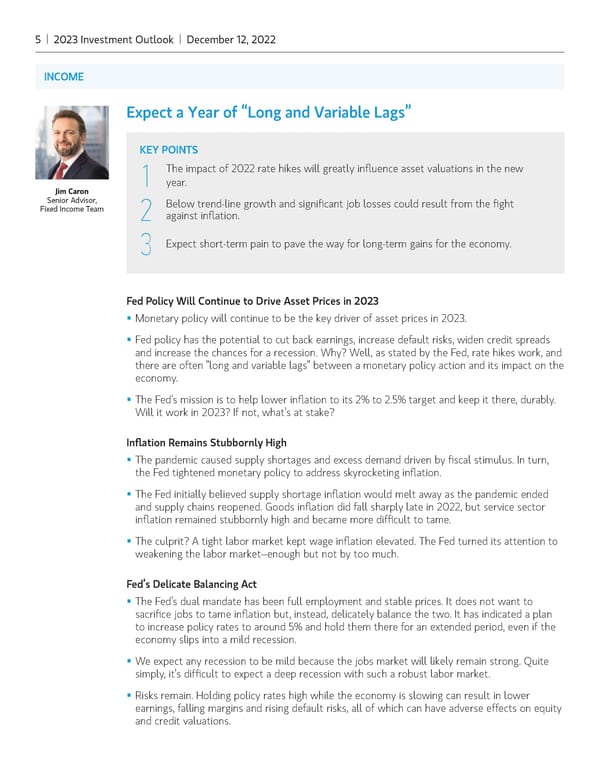5 | 2023 Investment Outlook | December 12, 2022 INCOME Expect a Year of “Long and Variable Lags” KEY POINTS The impact of 2022 rate hikes will greatly influence asset valuations in the new 1 year. Jim Caron Senior Advisor, Below trend-line growth and significant job losses could result from the fight Fixed Income Team 2 against inflation. 3 Expect short-term pain to pave the way for long-term gains for the economy. Fed Policy Will Continue to Drive Asset Prices in 2023 ƒ Monetary policy will continue to be the key driver of asset prices in 2023. ƒ Fed policy has the potential to cut back earnings, increase default risks, widen credit spreads and increase the chances for a recession. Why? Well, as stated by the Fed, rate hikes work, and there are often “long and variable lags” between a monetary policy action and its impact on the economy. ƒ The Fed’s mission is to help lower inflation to its 2% to 2.5% target and keep it there, durably. Will it work in 2023? If not, what’s at stake? Inflation Remains Stubbornly High ƒ The pandemic caused supply shortages and excess demand driven by fiscal stimulus. In turn, the Fed tightened monetary policy to address skyrocketing inflation. ƒ The Fed initially believed supply shortage inflation would melt away as the pandemic ended and supply chains reopened. Goods inflation did fall sharply late in 2022, but service sector inflation remained stubbornly high and became more difficult to tame. ƒ The culprit? A tight labor market kept wage inflation elevated. The Fed turned its attention to weakening the labor market–enough but not by too much. Fed’s Delicate Balancing Act ƒ The Fed’s dual mandate has been full employment and stable prices. It does not want to sacrifice jobs to tame inflation but, instead, delicately balance the two. It has indicated a plan to increase policy rates to around 5% and hold them there for an extended period, even if the economy slips into a mild recession. ƒ We expect any recession to be mild because the jobs market will likely remain strong. Quite simply, it’s difficult to expect a deep recession with such a robust labor market. ƒ Risks remain. Holding policy rates high while the economy is slowing can result in lower earnings, falling margins and rising default risks, all of which can have adverse effects on equity and credit valuations.
 Morgan Stanley 2023 Investment Outlook Page 4 Page 6
Morgan Stanley 2023 Investment Outlook Page 4 Page 6